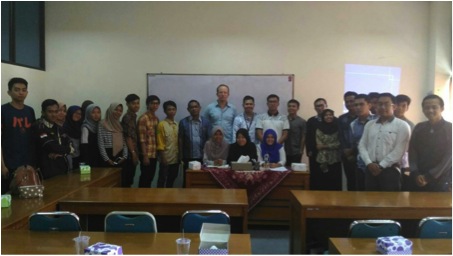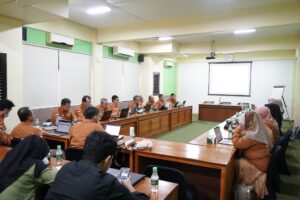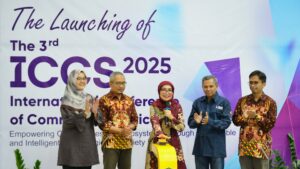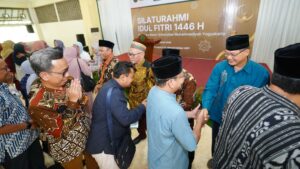BI Research Corner was established in 2016 by Bank Indonesia as part of its corporate social responsibilities. According to Bank Indonesia (BI) corner’s coordinator, Dimas B. Wiranatakusuma, who is also a lecturer at department of economics, BI Research corner aims at promoting the role of Bank Indonesia in pursuing monetary policy. Its vision is to promote research and academic atmospheres, particularly in the area of monetary macroprudential policy. These atmospheres are achieved by intensifying discussion and critical thinking among academicians, practitioners, and policy makers. Therefore, to achieve the vision, the mission is set by organizing routine academic discussion, and promoting research and publication.
As part of achieving the vision, on Saturday (1/10) BI Research corner collaborated with some students bodies such as HIMIE, KSPM, EES, and GESFID, organized public discussion on “Relaxing Monetary Policy: A New Normal. The discussion was underlain by two backgrounds, namely the business cycle fluctuations and the decrease of central bank rate.
The economy is moving up and down in line with the business cycles fluctuations. In the midst of financial turmoil, the business cycle moves towards cyclical downswing indicating indicates that crises are close to come. During this downswing, some indicators such as profits, investment, non-performing loans, and debt show negative alarm. On the contrary, during the cyclical upswing, some indicators reveal positive alarm as profit rate starts to rise.
In September 2016, Bank Indonesia, the monetary authority of Indonesia relaxed the monetary policy which is lower than the central bank rate. This low interest rate signals two conditions, whether the economy is in cyclical downswing or entering a new normal. If the economy is in a new normal, it means that the relaxing of monetary policy is intended to promote economic growth.
These two backgrounds were critically discussed and explored by panelists, Atilla Ghaspar, a PhD candidate in Economics from Central European University and visiting lecturer of IPIEF of UMY, and Dimas B. Wiranatakusuma, a lecturer of Economics Department of UMY. Atilla presented the issue of monetary policy in his country, Hungary. He noted that Hungary as small open economy is prone to financial instability. Moreover, Hungary as part of European Union is dependent on pursuing monetary policy. Therefore, he concluded that preserving monetary policy requires an extra effort for Hungaria and needs collaborative actions among related institutions.
Meanwhile, Dimas stressed the issue of business cycle in accordance with monetary policy implementation in Indonesia. He argued that Indonesia is now experiencing low interest rate which is in the new normal era. This new normal is also signed by several positive behaviors in fundamental macroeconomy, such as GDP, inflation rate, exchange rate, reserve, and interest rate. In conclusion, this new normal is a good opportunity for Indonesia to improve domestic economy.
The discussion was more interesting by several questions raised by Hudiyanto who queried economic system in Hungary in comparison with Indonesia. The public discussion was officially opened by Dr. Imamudin Yuliadi, Department Head of Economics of UMY. He appreciated the discussion and fully hoped that it will be routinely organized with various issues and presenters.







